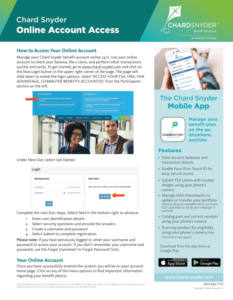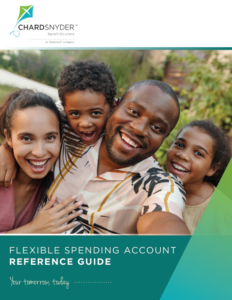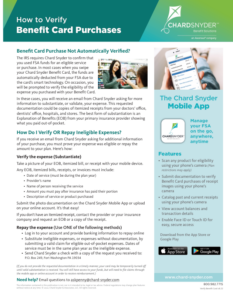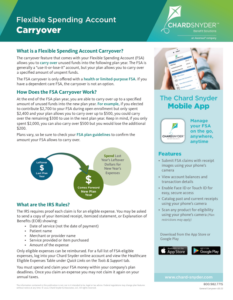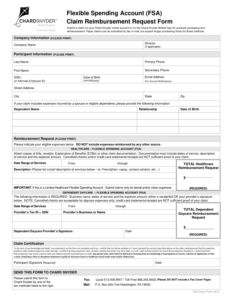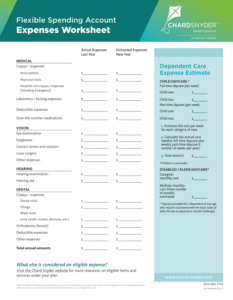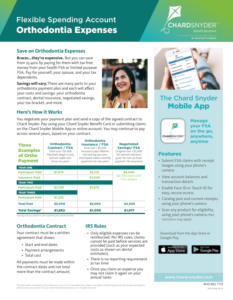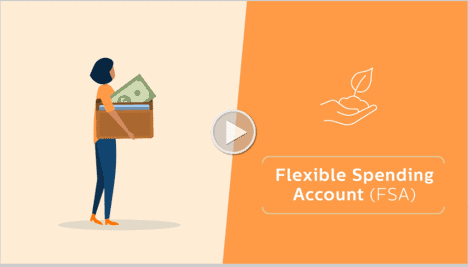FSA
A Flexible Spending Account is a special type of account you put money into to pay for certain out-of-pocket health care expenses. Your contributions to this account are not taxed so you will save the amount that would have been paid in taxes on this money.
BGDC provides both a Healthcare and Dependent Daycare FSA through Chard Snyder, a division of Ascensus. Chard Snyder offers you several ways to use the money in your FSA. For both healthcare and dependent care expenses, you can pay your provider directly online using the Chard Snyder Mobile App or your online account. For healthcare expenses, you can use the debit card to pay providers at the point of service.
Am I eligible?
Full-time associates are eligible for the flexible spending accounts. Associates enrolled in the HDHP plan who are contributing to the Health Savings Account are eligible for the limited purpose healthcare FSA as outlined below.
What Are Flexible Spending Accounts?
BGDC offers a flexible spending account, which allows you to set aside money, sheltered from most taxes, from each paycheck, into a separate fund, to cover the cost of certain healthcare items or services you’ll have to pay for. Since the money you set aside in an FSA reduces the income tax you pay each year, it’s like getting a discount on those expenses.
There are three types of FSAs:
- The Healthcare FSA lets you set aside pre-tax dollars through payroll for eligible medical, prescription, dental and vision expenses not paid by your insurance plans, like copayments, coinsurance and deductibles.
- Allows IRS-approved medical, Rx, dental or vision expenses not covered by the insurance plan with pre-tax dollars
- Your healthcare FSA plan allows a rollover provision up to $660
- Full annual election amount available immediately
- Some examples include:
- Medical copays and out-of-pocket expenses
- Pharmacy copays
- Dental services and orthodontia
- Hearing services, including hearing aids and batteries
- Vision services, including contact lenses, contact lens solution, eye examinations and eyeglasses
- The Dependent Daycare FSA This program lets you pay for certain IRS-approved dependent daycare expenses with pre-tax dollars.
- This program lets you pay for certain IRS-approved dependent daycare expenses with pre-tax dollars.
- Rollover provision does not apply. Use it or Lose it rule applies.
- Eligible for care while parents are at work or school.
- ONLY amount payroll deducted to date is available for distribution.
- Some examples include:
- Daycare/Preschool for dependent children to age 13
- Before and after school programs
- Day Camps during the summer (no overnight camps)
- The Limited Purpose Healthcare FSA only reimburses you for eligible dental and vision expenses. This account is for those who are enrolled and contributing to an HSA based on IRS rules. You can’t use it for any form of healthcare expenses.
- Allows IRS-approved dental or vision expenses not covered by the insurance plan with pre-tax dollars
- Your limited FSA plan allows a rollover provision up to $660
- Full annual election amount available immediately
- Some examples include:
- Dental Services and orthodontia
- Vision services, including contact lens solution, eye examinations and eyeglasses
The IRS 2025 maximum for the Healthcare and Limited Purpose Healthcare FSAs is $3,300. If you join the Healthcare FSA mid-year, your maximum allowed election will be prorated.
Your election will be taken from your paychecks in equal per pay amounts. You can then use that money to pay for eligible medical, dental, vision and pharmacy expenses for you and your family during the year. You can roll over up to $660 per year at the end of the year if you haven’t spent it. The full amount you’ve elected will be available any time after your effective coverage date.
The IRS 2025 maximum for the Dependent Daycare FSA is $5,000. If you join the Dependent Daycare FSA mid-year, your maximum allowed election will be prorated.
Please consider any FSA dollars you have already contributed during the calendar year through your previous employer when determining your FSA elections under BGDC to ensure you’re not exceeding the calendar year maximums for your household.
The list of eligible expenses in general includes medically necessary expenses for medical, pharmacy, dental, and vision expenses. To see a full list of expenses you can visit the Chard Snyder website.
How Do I Use the Healthcare FSA?
Below are examples of eligible medical expenses you can pay with the health care FSA:
- Copayments or deductibles under the medical plan (or similar expenses from your spouse’s medical plan if you are covered under your spouse’s plan)
- Non-covered vision plan expenses (co-pays and other out-of-pocket expenses)
- Non-covered dental plan expenses (co-pays, deductibles and other out-of-pocket expenses)
- Out-of-pocket costs for prescription drugs
- Other expenses which would qualify as a medical deduction on your tax return
- Certain over-the-counter medicines with a prescription from your doctor
Eligible Expenses
Healthcare FSA
- Most out-of-pocket medical expenses
- Prescription/over-the-counter medications
- Dental/vision expenses
- Fertility treatment
- Maternity Charges
- And more
Dependent Daycare FSA
- Day care
- After-school Programs
- Elder Care
- Nanny/babysitter expenses
- Preschool/nursery school
- And more
To see a complete list of eligible expenses, please visit Chard Snyder resource library
The account cannot be used to reimburse some types of expenses, such as:
- Non-medically supervised programs to help you lose weight
- Non-medically necessary cosmetic surgery
- Non-prescription sunglasses
- Teeth bleaching
- Funeral expenses
- Any expense not considered “medically necessary” by the IRS
What if I Don’t Use All the Money in my FSA?
You should plan carefully before deciding how much money to put into an FSA so that you don’t lose any unused funds at the end of the calendar year.
- You can roll over up to $660 in unused money from either the health care FSA or the limited purpose FSA from one calendar year to the next.
- Any additional unused money is forfeited.
- You cannot roll over any unused money from the dependent care FSA at the end of the calendar year. It’s strictly a “use it or lose it” account.
Chard Snyder Benefit Card
If you enroll in the Healthcare or Limited Purpose Healthcare FSA, you will receive a debit card to use when paying for services you receive, if you choose. It works just like a typical debit card, except that it should only be used for qualifying expenses such as those listed above.
The Chard Snyder Benefit Card provides an easy, convenient way to use your FSA funds to pay for eligible items and services. You will receive a debit card to use when paying for services you receive. It works just like a typical debit card, except that it should only be used for qualifying expenses such as those listed above. The Chard Snyder Benefit Card is only to be used for your Healthcare FSA not your Dependent Care FSA.
If you select the full or limited Healthcare FSA for the first time, you will receive a new debit card good for 5 years.
If you enroll in the HSA for 2025 and have funds left in your Healthcare FSA as of December 31, 2024, that money will automatically be rolled over into the Limited Purpose FSA (dental and vision expenses only) according to IRS rules.
Not Sure How to Spend Your FSA Money?
Visit the Chard Snyder FSA Store for the largest selection of FSA-eligible products


